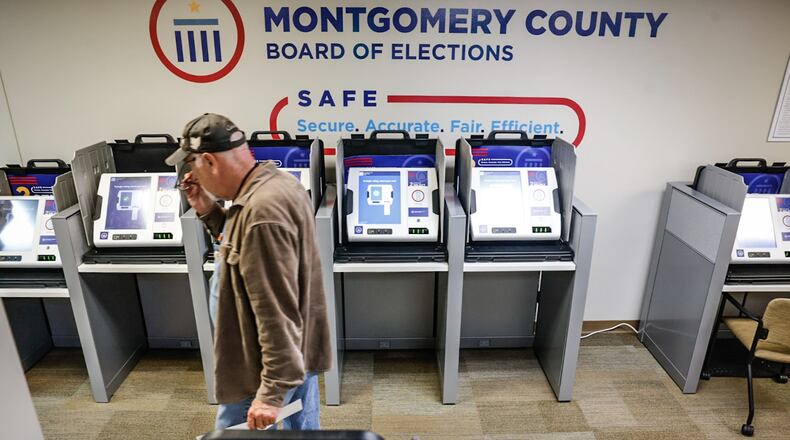Ohio’s current voting rules went into effect in 2023 — some critics have called it the strictest voting law in the nation.
Although several changes could be seen in the Buckeye State under the executive order, legal experts challenge its constitutionality.
Executive power
Republican Ohio Secretary of State Frank LaRose said the executive order gives states better access to citizenship data. His office is still reviewing the order to see how it applies to his state.
“I appreciate President Trump’s decisive leadership to protect the integrity of our elections,” he said. “Fortunately, I can say that a lot of this we already do in Ohio, but where there’s an opportunity to do more we can certainly work with our state and federal lawmakers to address it.”
But Common Cause Ohio director Catherine Turcer said Ohioans shouldn’t expect the executive order to be implemented. The U.S. Constitution gives state legislatures the power to establish election rules.
“This is an incredible power grab,” Turcer said. “This is so clearly unconstitutional, it will be challenged.”
Turcer said that if implemented, however, the order could disenfranchise vulnerable groups of eligible voters and put a strain on election officials.
Citizenship and voting
Ohio has more than 8 million registered voters. Trump’s executive order would update a federal voter registration form to require proof of citizenship, like a passport or military ID.
Turcer said as written, this could spell the elimination of registering to vote online and the end to voter registration drives.
Noncitizen voting, which is already illegal in Ohio, is exceedingly rare.
Ohio’s updated voting law required the Bureau of Motor Vehicles to add a “noncitizen” designation to state ID cards and licenses issued to immigrants, and LaRose’s office emphasized this new feature in the training required of election workers ahead of the presidential election last year.
Last year, six people — one of whom was dead — were indicted for allegedly voting in Ohio elections when they were not U.S. citizens, according to Ohio Attorney General Dave Yost. These six indictments were among 138 total allegations made by LaRose’s office of people who were improperly voting.
“What I end up worrying about is that we’re so focused on keeping people out, that truly eligible voters are not able to participate in our elections,” Turcer said.
Voting by mail
Trump’s order requires votes to be “cast and received” by Election Day and says federal funding should be conditional on state compliance with that deadline.
Ohio, like several other states, accepts mail-in ballots after Election Day as long as they’re postmarked by the day before the election, but ballots with these postmarks must be received no later than four days after the election.
Democrat and oncologist Bryan Hambley, who is running for Ohio Secretary of State in 2026 with LaRose being term-limited, said this curtailing of the absentee voting timeline is harmful to groups who rely on mail-in voting to participate in elections.
“This will overwhelmingly harm our overseas veterans, elderly folks, and those with mobility disabilities,” he said in a statement issued following Trump’s executive order. “Voting by mail is safe, and millions of Americans have voted by mail since the Civil War.”
Impact on voters
The executive order from Trump comes as congressional Republicans mull over the Safeguard American Voter Eligibility Act, or SAVE Act. This legislation aims to also require proof of citizenship to register to vote.
Voting rights advocacy groups say this order could create obstacles for citizens who want to lawfully vote, but the U.S. Constitution gives power to the state legislature to establish the manner of elections.
League of Women Voters President Celina Stewart said the executive order would particularly create a burden for married women who adopt their partner’s last name.
Women under these circumstances would be unable to register to vote if the last name on their ID does not match their proof of citizenship, thus requiring them to provide additional documentation.
“Let’s keep it real: this order is not about protecting elections; it is about making it harder for voters — particularly women voters — to participate in them,” Stewart said in a press release.
Christine Corba, who is the president of the League’s Dayton chapter, said her organization helps those who are eligible to vote to have the opportunity to cast their ballots.
“When there are additional hurdles to being able to vote, that hurts democracy,” she said.
About the Author

